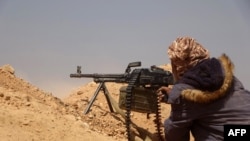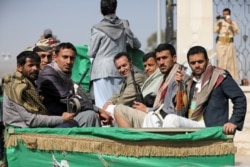The leadership of Yemen's Houthi rebels is apparently prioritizing a military offensive over its plan for a nationwide cease-fire, the U.S. special envoy to the Middle Eastern country said Friday.
"We now have a sound plan for a nationwide cease-fire with elements that would immediately address Yemen's dire humanitarian situation directly," U.S. envoy Tim Lenderking told the American research organization, the Atlantic Council, virtually Friday.
"That plan has been before the Houthi leadership for a number of days," Lenderking added.
Lenderking's remarks came after a visit to the region to revive efforts to end the six-year civil war. "I will return immediately when the Houthis are prepared to talk," Lenderking said.
A military coalition led by Saudi Arabia intervened in the war in 2015 after a Houthi group aligned with Iran ousted the Yemeni government from the capital of Sanaa.
The Houthis contend they are battling a corrupt system and have recently concentrated efforts to gain control of the gas-rich area of Marib, the government's last stronghold in northern Yemen.
Lenderking also said the U.S. would restore funding for humanitarian aid in northern Yemen and would collaborate with Yemen and Saudi Arabia to deliver fuel to those most in need.
The war has put millions of Yemeni civilians at risk, according to the United Nations, which has described it as the world's worst humanitarian crisis.
About 80% of the country's population needs humanitarian assistance and some 400,000 children under 5 are severely malnourished, according to the U.N.
Yemen relies heavily on food imports that have been disrupted by "all the warring parties," the U.S. Agency for International Development's Sarah Charles told the Atlantic Council. She added the "most egregious" disruptions have been committed by the Houthis in northern Yemen.
The country's humanitarian crisis has been exacerbated by economic and currency collapses and the ongoing global coronavirus pandemic.






